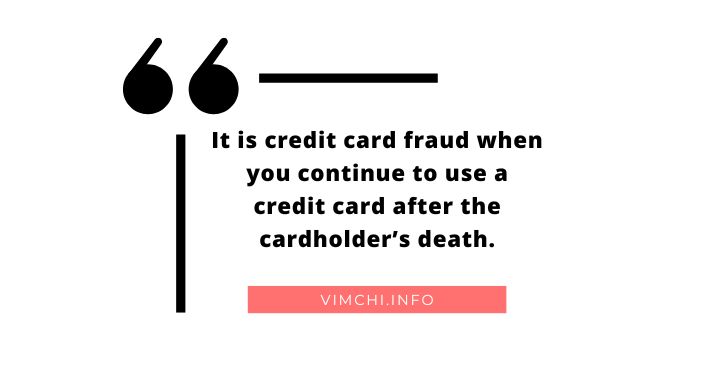
Money stress can make people more likely to commit suicide. Many people think that when they die, their financial hardship will be gone. Is credit card debt inherited? Will your loved ones become affected when you die without paying your credit card debt?
Does Your Credit Card Debt Follow You to the Grave? Is it Inherited?
A credit card will not follow you to the grave. In that case, your kids won’t inherit it. But there’s a caveat.
Your debt will still live on. It is paid through estate assets. If you have a joint account holder, the debt will be the joint account holder’s responsibility.
If you are a beneficiary of the estate, you will feel the effects of the credit card debt of your spouse. This is true even if you are not liable for the debt on a credit card.
Any debt left behind after a loved one passes away can eat much of the remaining assets. The beneficiaries of the assets will receive what is left over.
Creditors can file a claim against the estate. If it is probated, creditors are prioritized.
Since credit card debt is not secured, the credit card company will be at the back of the line. Unfortunately, beneficiaries are further down the line than credit card companies.
In that case, if the state does not have money to pay the debts, beneficiaries would pay the remaining debt.
Read: Should You Use Credit Card Debt Consolidation?
How to Handle Credit Cards After Death?
When your loved one dies, you may forget about the financial institutions. Unfortunately, this is wrong. Plenty of things can go wrong if this critical task is neglected.
Remember that identity thieves can easily look for recently deceased people and impersonate them to create new accounts. They can use your deceased relative to open a new account and borrow money.
Hackers can also steal from existing accounts. If you have not notified banks and card issuers of the dead person yet, they can continue using their accounts to conduct malicious activities.
How to Prevent These Issues?
Even though credit card debt is not inherited, credit card companies can still take a hold of a person’s assets to ensure that the debt is paid off.
If your spouse died, you should organize his financial accounts. Request a copy of his credit report.
Your name might be on a credit card without you knowing it. For instance, he might have filled out the credit card applications without telling you.
The accounts could show up at the time of his death. That’s why it is pertinent to check your credit card reports regularly.
You should resolve any credit card debt before death or a traumatic event.
Request Copies of Death Certificate
Once you have the credit report of your dead husband, make sure to send the credit card companies of your husband’s death certificate. You should also send this document to life insurance companies.
Don’t Use the Credit Card

When your husband dies, his credit card is no longer valid. Thus, you must avoid using it. Don’t attempt to use it to pay for his funeral expenses.
It is credit card fraud when you continue to use a credit card after the cardholder’s death. And yes, it could get you into big, expensive trouble.
Collect all credit cards of your dead husband. Keep them in a safe place or destroy them so you never be tempted to use them.
Read: What to do with Your Credit Card Debt?
Close the Credit Card Accounts
After your husband dies, you should close all of your credit card accounts. Be quick about it to avoid any interest charges.
If you have a joint credit card, make sure to notify the credit card issuer that the joint cardholder, in this case, your husband, has died.
Cancel all automatic charges to the account. They may include a phone bill or a utility bill. You may consider transferring them to your card.
Contact the credit card companies to flag your husband’s account. Ask for their address to send the necessary documentation.
When the credit card issuer receives the letter, they will ask for an official copy of the death certificate, which you’re going to mail to them.
Where Does the Debt Go?
Your husband’s credit card debt will not go into thin air after his death. You are not responsible for paying off his debt.
The division of an estate’s assets occurs before the inheritance is passed on to you. In this case, his assets will be sold to pay his debts.
If the debt exceeds the assets left behind in the estate, the creditors can pursue you.
Protecting Assets from Creditors
You should know your rights. Lenders can’t force you to pay the remaining debts of your husband.
That’s why it is pertinent that you know your rights regarding the specific state’s set of laws on the types of debt.
When your loved one dies, handling his finances can be complex. It is a difficult process that needs educating yourself about the intricacies.
Although it is a complex and uncomfortable topic, you should plan. It is a vital part of responsible estate preparation.
The best thing that you can do for your spouse and your family is to prepare the right documents. Even though your credit card debt can’t be inherited by your spouse or your children, they are still affected by it.
Speak Now ... Or Forever Hold Your Peace